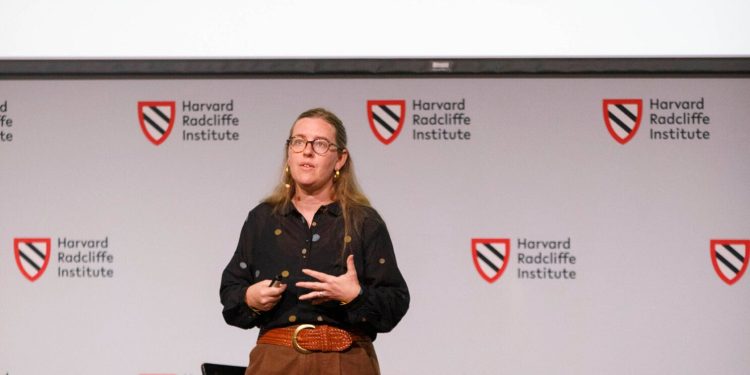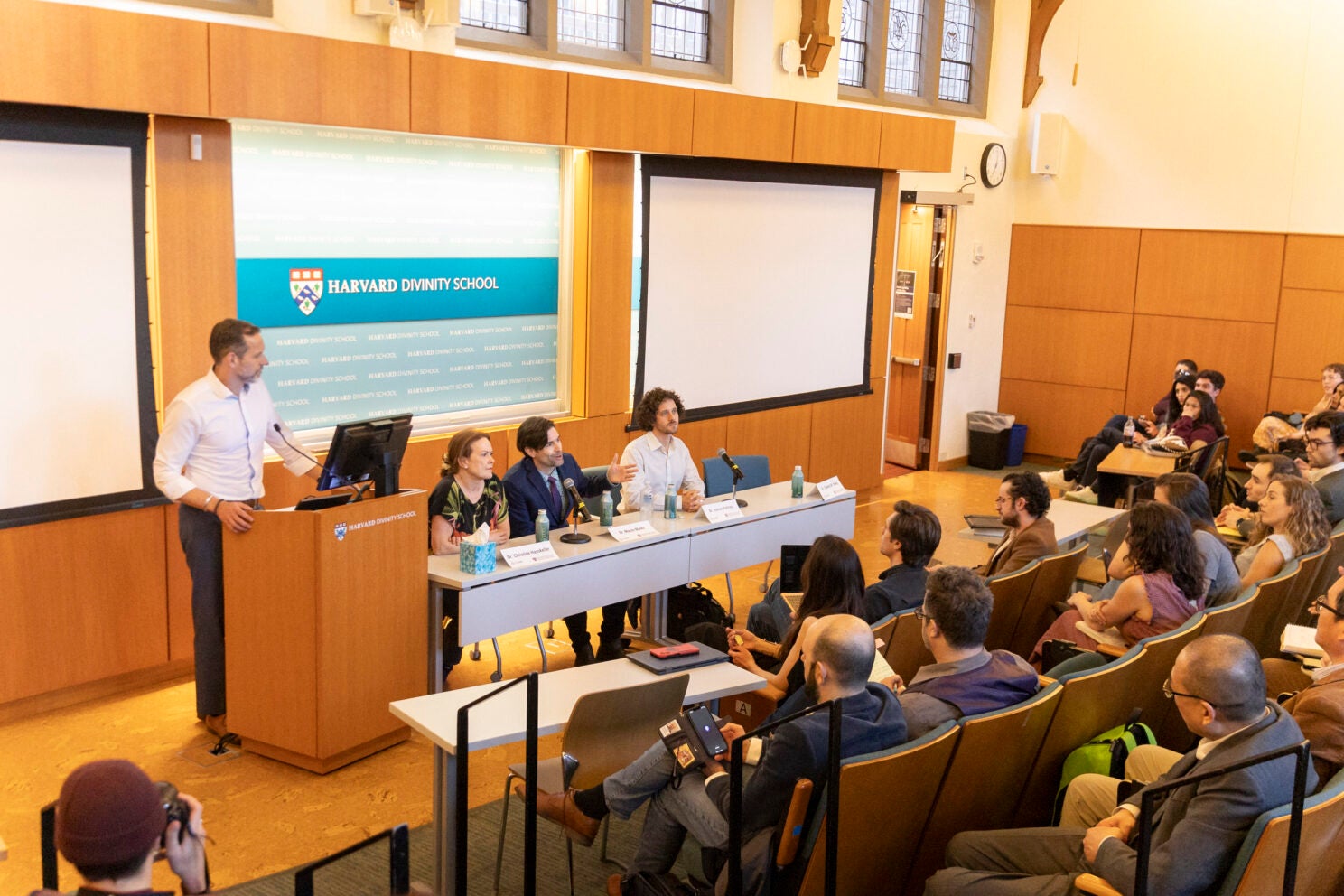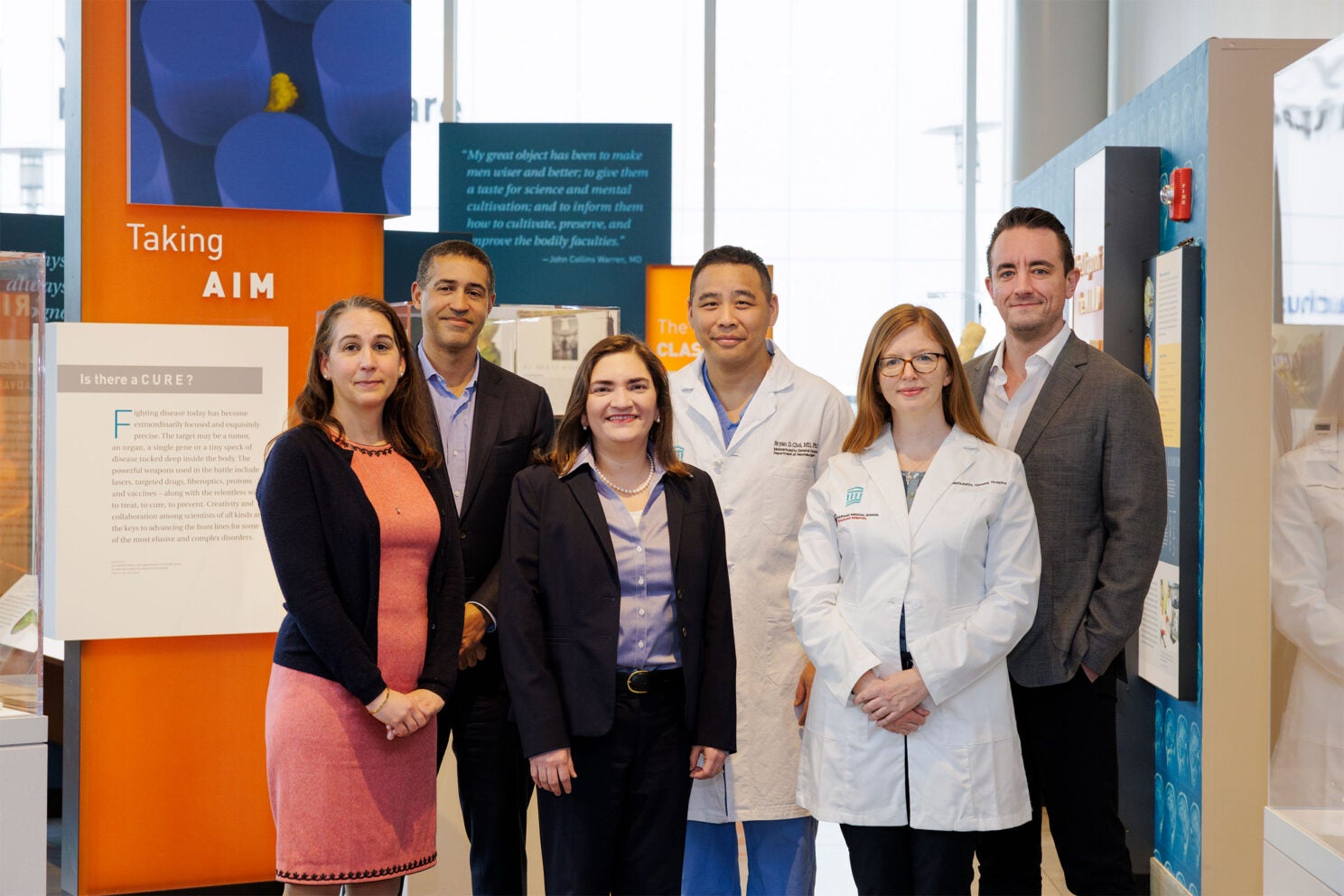Christina Warinner explores “The Milk Paradox.”
Kris Snibbe/Harvard Staff Photographer
Health
Got milk? Does it give you problems?
Biomolecular archaeologist looks at why most of world’s population has trouble digesting beverage that helped shape civilization
Milk is something of a head-scratcher for Christina Warinner.
It is rich in protein, vitamins, and minerals and has served as an important food source since prehistoric times. For much of human history, milk has been consumed in various parts of the globe and has helped shape civilization, said Warriner, an anthropologist specializing in biomolecular archaeology.
But the genetic and nutritional story is complex for most of the world’s population and that has puzzled Warriner.
“We produce nearly 700 million tons of milk each year,” said Warinner, the Sally Starling Seaver Associate Professor at Radcliffe, during a Wednesday webinar, “The Milk Paradox.” “And yet we know that most of the world’s population has a lot of difficulty digesting fresh milk. So how do we get to the point where we have this food, which is spread globally and is consumed in so many different places and on every continent in various contexts, and yet it’s very difficult for us to digest?”
When humans are infants, they produce an enzyme called lactase that helps digest lactose, a sugar found in milk, but when they become adults, they stop producing it, which leads to lactose intolerance, a condition present in 65 percent of the adult human population around the world.
“When you’re an adult, you don’t produce lactase anymore, and the lactose will pass undigested into your large intestine, which is full of trillions of bacteria,” said Warinner. “They are more than happy to help you digest that lactose. The problem is in the process, because they will produce about eight liters of hydrogen gas for every quart or liter of milk that you consume.”
In her talk, Warinner, who is also the John L. Loeb Associate Professor of the Social Sciences, spoke about her interdisciplinary approach, which includes archeology, anthropology, and ethnography, to reconstruct the prehistory of milk, the origins of dairying, and its spread throughout the world.
The story of dairying took place over thousands of years from its origins in the region that encompasses West Asia, the Balkans, and North Africa to its migration to Europe and then around the world.
Scientists believed for decades that early Neolithic farmers developed a genetic mutation that allowed them to produce lactase during adulthood to properly digest milk. This change proved beneficial as they migrated to Europe, which helped them expand over the continent and replace most of the previous hunter gatherers, said Warinner.
Today lactase persistence is common in people of European ancestry as well as some African, Middle Eastern, and Southern Asian groups.
New scientific developments, including ancient DNA analysis and genome sequencing, found that there was no lactase persistence among early farmers during the Neolithic era, and raised questions about the moment when this genetic mutation took place, said Warinner.
“So this opens up a huge question, because medically we explain lactose tolerance on the basis of these mutations or adaptations,” said Warinner. “And yet for 4,000 years, people are dairying; they developed this whole food purposefully, and then they had no genetic basis to digest it. How does this work?”
It is a question that Warinner has tried to solve in her research. “I started to wonder if there might be alternative ways of adapting to a dairy-based diet that isn’t based on your own genome, but might be adapting through the use of microbes, whether that might be, for example, culinary microbes, and through fermentation, or by adapting your own gut microbiome to be able to facilitate and improve digestion.”
Warinner’s research took her to Mongolia, a country with a long history of dairying whose economy is still centered around it, and where local herders milk more species of livestock than anywhere else in the world.
Warinner’s five-year research effort included working with archeologists in Mongolia to reconstruct genomes of ancient Mongolians to see whether they showed signs of lactase persistence.
They found low lactase persistence, which is still the norm. They also studied local cattle and yak herders to analyze their gut microbiomes and compared them with those of residents in Ulaanbaatar, the capital city.
What they found was riveting, said Warinner. Their research was able to trace the history of dairying in Mongolia, which goes back 3,000 years. The analysis of hardened tooth plaque from human skeletons found in burial mounds revealed traces of milk proteins from cows, yaks, goats, and sheep.
When they analyzed lactose intolerance among herders and urban residents in Mongolia, they found that herders showed very few symptoms of lactose intolerance and low hydrogen presence. They also found that the herders’ gut microbiome showed a high volume of lactic acid bacteria, or probiotics, which may help digestion, as well as bifidobacteria, or healthy bacteria that are especially abundant in young infants and help metabolize lactose without producing any hydrogen, said Warinner.
During her talk, Warinner highlighted the way in which archaeology can help inform present-day issues or challenges, such as finding out the many ways in which humans developed dairy products and adapted to consuming milk and dairy products.
“There’s one trajectory, which is to alter the human genome, and we’ve seen this in a number of populations around the world, but an alternative pathway seems to alter the microbes that we interact with both through food and through our own gut microbiome,” said Warinner.
As for the questions guiding her next research, Warinner said, “What change caused the genetic adaptations that occurred in some populations? We don’t know what the trigger was for it, or why in Mongolia, even when it’s introduced, it was never selected for. Those are open questions that we hope to resolve.”















